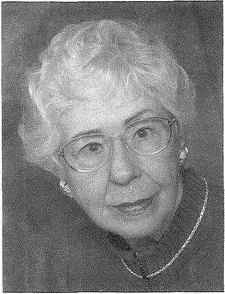Angela N. Ewer

Angela Ewer's path to Branford's Education Hall of Fame took her through New Haven's Hillhouse High School where she graduated in 1950. After earning her Bachelor of Science degree in Education from New Haven State Teacher's College (SCSU) four years later, Angela began her teaching career in North Haven. Six years later she put her career on the back burner to begin a family. With her husband Jasper, she had two children, Jay and Angela. In 1966 she resumed her teaching here in Branford and spent the next twenty-nine years serving the young people of our community.
The hallmarks of Angela's teaching were the de tail with which she planned her lessons, the depth that she brought to the material that was part of her curriculum and the level of critical thinking she was able to promote in her students. Angela almost never taught a subject without exposing students to several different perspectives and she modeled outstanding interdisciplinary instruction long before the term became an educational catch phrase. Angela's keen mind constantly brought experiences to her students, which enriched their understanding of history and language arts by introducing aspects of music, art, current events, and at times even philosophy. Her teaching was characterized by thoughtful lesson design, creative approaches to the delivery of material to her students and a thoroughness, which insured day-to-day excellence in everything she did. An example of how this translated into her teaching was that before she took her class on a field trip to the Museum of Natural History in New York, she visited the Museum herself on a weekend prior to the field trip and made out a detailed study guide for her students which included things to look for and questions for them to answer which served to integrate and reinforce their experience. Visiting her classes gave ongoing evidence of an educator who never accepted anything less than a student's best effort and who modeled a positive work ethic on a daily basis for her students. Everything Mrs. Ewer did was focused on helping students develop concepts and attitudes that are the foundation of meaningful social studies education.
Angela Ewer was a demanding teacher, but an understanding one. She was an active participant in the professional development initiatives that were available to her and constantly embraced new techniques and strategies in her classroom.
Angela was a longtime member of the Branford Education Association and, during the turbulent early seventies, was a leader in the BEA. She and BEA leadership colleagues were responsible for precedent setting actions that contribute greatly to the passage of current labor relations laws that changed the face of contract negotiations within Connecticut.
The hallmarks of Angela's teaching were the de tail with which she planned her lessons, the depth that she brought to the material that was part of her curriculum and the level of critical thinking she was able to promote in her students. Angela almost never taught a subject without exposing students to several different perspectives and she modeled outstanding interdisciplinary instruction long before the term became an educational catch phrase. Angela's keen mind constantly brought experiences to her students, which enriched their understanding of history and language arts by introducing aspects of music, art, current events, and at times even philosophy. Her teaching was characterized by thoughtful lesson design, creative approaches to the delivery of material to her students and a thoroughness, which insured day-to-day excellence in everything she did. An example of how this translated into her teaching was that before she took her class on a field trip to the Museum of Natural History in New York, she visited the Museum herself on a weekend prior to the field trip and made out a detailed study guide for her students which included things to look for and questions for them to answer which served to integrate and reinforce their experience. Visiting her classes gave ongoing evidence of an educator who never accepted anything less than a student's best effort and who modeled a positive work ethic on a daily basis for her students. Everything Mrs. Ewer did was focused on helping students develop concepts and attitudes that are the foundation of meaningful social studies education.
Angela Ewer was a demanding teacher, but an understanding one. She was an active participant in the professional development initiatives that were available to her and constantly embraced new techniques and strategies in her classroom.
Angela was a longtime member of the Branford Education Association and, during the turbulent early seventies, was a leader in the BEA. She and BEA leadership colleagues were responsible for precedent setting actions that contribute greatly to the passage of current labor relations laws that changed the face of contract negotiations within Connecticut.